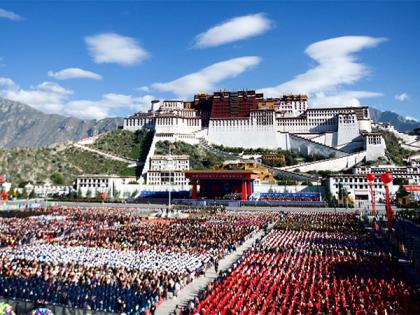China marks 60 years of cultural destruction in Tibet, not liberation, says International Campaign for Tibet
By ANI | Updated: August 8, 2025 16:19 IST2025-08-08T16:14:41+5:302025-08-08T16:19:55+5:30
Dharamshala [India], August 8 : As the Chinese Communist Party gears up for grand celebrations marking the 60th anniversary ...

China marks 60 years of cultural destruction in Tibet, not liberation, says International Campaign for Tibet
Dharamshala [India], August 8 : As the Chinese Communist Party gears up for grand celebrations marking the 60th anniversary of the founding of the so-called "Tibet Autonomous Region" (TAR) on September 9, Tibetan advocacy groups have sharply criticised the move, calling it a facade that masks decades of repression, forced assimilation, and cultural destruction in Tibet, according to Phayul.
In a statement released on August 6, the Washington-based International Campaign for Tibet (ICT) denounced the anniversary, stating that Tibetans have endured 60 years of "calamity" under Chinese rule. "Instead of forcing Tibetans to put on a performance of gratitude, China must change course and put the interests of the Tibetan people ahead of their own compulsive need for power and control," said ICT President Tencho Gyatso, as quoted by Phayul.
The so-called TAR, established in 1965, comprises less than half of Tibet's traditional territory and includes only parts of the historical provinces of U-Tsang and Kham. ICT highlights that the formation of the TAR followed years of broken promises after China's 1950 military invasion and the coercive signing of the 17-Point Agreement in 1951, which had promised autonomy and cultural preservation, promises that ICT says were quickly abandoned.
According to Phayul, since the 1965 formation of the TAR, no Tibetan has ever held the top political post of Party Secretary. Instead, Han Chinese officials have maintained control, including Chen Quanguo, later sanctioned by the U.S. for human rights violations in East Turkestan, and Wu Yingjie, who in 2024 was reported to be under investigation for massive bribery.
Tibetans continue to face harsh restrictions, the ICT says, including the criminalisation of the Dalai Lama's image, the disappearance of the 11th Panchen Lama, and the imposition of Mandarin Chinese in schools and courts, despite constitutional guarantees for ethnic language rights. As Phayul reports, a 2023 Human Rights Watch investigation further exposed the growing use of boarding schools to assimilate Tibetan children forcibly.
The ecological relocation of tens of thousands of Tibetan nomads, dam construction, and mining on the Tibetan plateau, without local consent, have also contributed to cultural erosion and environmental degradation, ICT warned.
Freedom House has consistently ranked Tibet among the least free regions globally, assigning it a score of 0 out of 100. The U.S. State Department, UN bodies, and the European Union have all expressed serious concern, Phayul notes.
As Chinese authorities prepare to stage official celebrations across TAR cities, Phayul reports that rights groups are urging the international community not to be misled by the spectacle, which they say serves to whitewash six decades of occupation and suppression.
Disclaimer: This post has been auto-published from an agency feed without any modifications to the text and has not been reviewed by an editor
Open in app